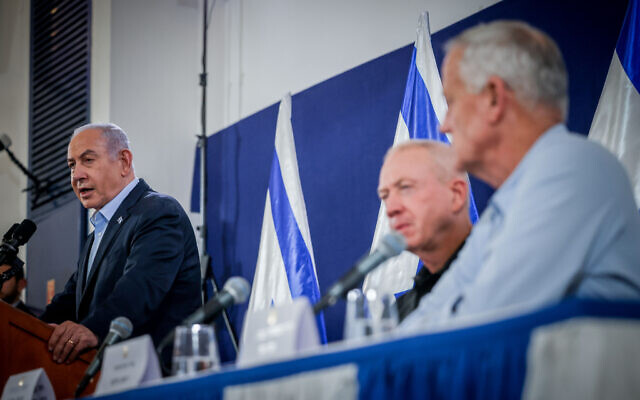



War cabinet observer Gadi Eisenkot reportedly sent a letter to other members of the high-level forum warning that they were failing to make operational decisions and therefore the strategic goals of the war against Hamas were stalling.
A report on Channel 12 news Monday evening said the letter was sent a week ago, and included a warning by Eisenkot — a former IDF chief — that “there is an increasing difficulty in achieving the goals of the war.”
“No determinative decisions have effectively been made in three months. The war is conducted in accordance with tactical objectives, without meaningful moves to achieve the strategic objectives,” Eisenkot, a member of the National Unity party, was quoted as writing.
Eisenkot, whose son and nephew were both killed fighting in Gaza in December, laid out in the letter what he believes Israel has and has not accomplished since declaring war on Hamas following the terror group’s October 7 onslaught. Things it has partially achieved included reducing Hamas’s ruling capabilities, returning the hostages, and returning security to border communities, the report said.
Things it has not achieved were ending the fighting without a security threat from Gaza and strengthening the sense of personal security of Israeli citizens, according to the reported letter, which said none of Israel’s goals for the war have been accomplished in full.
Eisenkot reportedly set out a list of goals that need to be achieved: to reach a deal to bring back the remaining hostages before Ramadan in mid-March; to prevent an escalation in the West Bank during Ramadan; returning evacuated citizens in the north and south; advancing a civilian alternative to Hamas rule in Gaza; and moving to the “third stage” of fighting in Gaza with spot raids amid overall stability.
The network said he concluded the letter with a criticism of Prime Minister Benjamin Netanyahu for his repeated insistence that Israel will achieve “total victory” over Hamas.
“I am convinced that all cabinet members are interested in achieving total victory,” he was reported to write. “Together with the prime minister’s comment that total victory will be obtained within months, and with the understanding [this remark] was not only meant for propaganda purposes, it’s right to seriously deliberate this concept and clarify it operationally.”

Following the report, a group representing the families of hostages and their supporters called for Defense Minister Yoav Gallant to meet them immediately, demanding to know if he still “sees himself as committed to returning the hostages and where this aim is ranked with the other goals of the war.”
“If the families’ request is not answered by the time the war cabinet convenes tomorrow evening, all the families will be waiting for the minister at the entrance… and will demand clear answers to the concerning questions raised in Minister Eisenkot’s letter,” said the statement from the Hostages and Missing Families Forum.

Earlier this month, the Kan public broadcaster reported on similar criticism by Eisenkot, who accused Netanyahu of wasting time in the war against Hamas and expressed concern that major decisions were being made unilaterally, when they were made at all.
In response, an Israeli official told The Times of Israel that Netanyahu was behind intensive debates and studies being performed on the future of Gaza.
Eisenkot also criticized the war effort in January, saying in an interview that it was accurate to speak of far-reaching success over Hamas in northern Gaza, but “whoever speaks of the absolute defeat [of Hamas in Gaza] and of it no longer having the will or the capability [to harm Israel], is not speaking the truth. That is why we should not tell tall tales.”

The criticism by Eisenkot adds to mounting tensions between National Unity and the right-wing coalition the party joined at the start of the war, which erupted on October 7 after the Hamas onslaught on southern Israel that killed some 1,200 people and saw 253 taken hostage to Gaza.
In the first few weeks after joining the government, National Unity’s leader Benny Gantz and Netanyahu displayed a united front, appearing together in press conferences along with Gallant and seeming to agree on core matters relating to the war.
However, as political disagreements began to resurface in the Knesset, so too have tensions between Gantz and Netanyahu, with the former soaring in public opinion polls while Likud and its leader have dropped sharply.
As the strains between Gantz and Netanyahu became visible, with the two criticizing each other in carefully worded statements on various issues that have split public opinion, there has been growing speculation on how much longer the delicate partnership will last.
